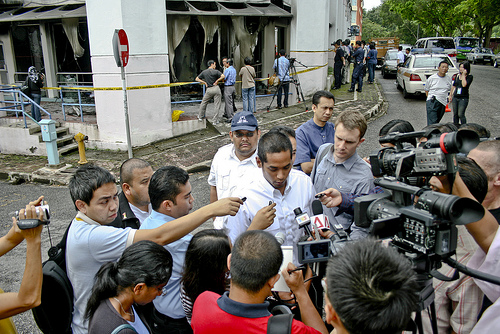The subsequent attacks on churches represented a violent rejection of the High Court ruling by radicalised sections of Malaysian society. ‘Allah’, they asserted in the language of Molotov cocktails, was only for Malays.
This semantic quibble can seem baffling to non-Malaysians, but it is wholly explicable within the context of Malaysian social dynamics. The trouble arises from the conflation of at least two factors: first, the troubling relationship that exists between ‘Malay’ and ‘Muslim’ in Malaysia, and second, the relationship that Malay-Muslims have with the rest of Malaysian society.
It should be made clear that there are at least two words for ‘God’ in Malay: ‘Allah’, and ‘Tuhan’. The first is from Arabic: a Semitic word for the divine, combining the definite article al- (the one) with the root word -ilah (god). The second and probably older word in the region, ‘Tuhan’, shares a common etymology with the Austronesian word ‘atua’, or ‘te atua’ in Maori, meaning ‘god’. The link isn’t surprising. Malay is a member of the Malayo Polynesian language tree, and many other linguistic commonalities run throughout the region: Indonesian, Micronesian, Polynesian and Philippine languages are all relatively closely related.
Both words have been in use in Malay, more or less interchangeably, throughout its written history. Even on the Terengganu Inscription Stone, the earliest extant evidence of Islam on the Malay peninsula, which dates to around 1303 CE, the word ‘Allah’ appears three times, and the word ‘Tuhan’ twice. What has animated the controversy, however, is the claim by the ruling government that the word ‘Allah’ is something especially Islamic, and by extension, exclusively Malay. The trouble comes at ‘by extension’.
Under the Federal Constitution, a Malay is defined as a person who, firstly, is born to a Malaysian citizen, who professes to be Muslim, who speaks the Malay language, who adheres to Malay custom and, finally, is domiciled in Malaysia. This definition comes directly from the Land Reservation Act of 1913, which the British passed in an attempt to define the group of people for whom state protectionist policies were intended.
But over time the definition proved both politically expedient and psychologically central to Malay self-perception. The British gained much colonial mileage out of professing to be protecting ‘the Malays’, and ‘the Malays’ came to see themselves as a coherent cultural entity. The result is that today this definition is no longer only politically instrumental; it has become true for many Malays. It is an authentic description of what their sense of identity rests on: geography, language, culture — and religion. The latter figures most importantly: Malays who convert from Islam are no longer considered constitutionally Malay; Malay Christians are unthinkable.
But why is Islam, more than the other four elements of the definition, such an important part of Malay identity? The answer here, I feel, is demographic, and one can see that by comparing Malaysia with Indonesia.
Visible ethnic minorities in Indonesia have never comprised a large part of the population; today they are often deeply assimilated. The Chinese population, at 3-5 per cent of the total, is relatively small. Indonesians, who speak a language similar to Malay, have never experienced anxieties over which ethnic or linguistic group is entitled to use the word ‘Allah’. Indonesian Christians use it without a second thought.
In contrast, Malaysia is a much more heterogeneous society, with Malays making up around 60 per cent of the population, ethnic Chinese somewhere around 25-30 per cent and ethnic Indians, mostly Tamils but also some Punjabis, around 8 per cent. This has led to a certain amount of racial insecurity. The proximity of cultural difference has created incentives for Malays to differentiate themselves, and to cling tightly to those differences. And in Malaysia, of the five constitutional elements of ‘Malayness’ I listed above from the 1913 definition, only two remain which are not now widely shared by all citizens since independence in 1957: Malay ‘custom’, and Islam.
Religion has therefore become a central marker of ethnic identity in Malaysia. And here is the nub of the problem. In the case of Islam, a religion that has historically spread with its carrier language, Arabic comes with the territory. It’s not so
much that many Malays speak Arabic, but rather that any connection to the Arabic culture and language should be, in Malaysia, only effected through Islam — which is in turn almost exclusively Malay.
One sees this connection embedded in the Malay language, where words of Arabic origin often acquire an aura of intrinsic religiosity. The word ‘kitab’, for example, may just refer to a normal ‘book’ in Arabic, but in Malay it refers specifically to religious books, while secular books are simply ‘buku’, from English. Something similar is happening here with ‘Allah’. It may ‘just’ mean ‘God’ in Arabic, but in Malaysia, amidst identity politics and deep-rooted Malay anxieties, it is much more than a semantic quibble.
The claim that only Malay-Muslims are entitled to use the word ‘Allah’, and that everyone else must use ‘Tuhan’, certainly arises out of this ingrained defensiveness over what it is to be Malay.
The claim that ‘Allah’ is somehow especially Islamic is disproved at least by the fact that the word itself predates Islam. Any argument that it has become Islamic over time is furthermore disproved by the fact that it remains in use today by Arab Christians and Indonesian Catholics.
The dogged adherence to this claim by a small number of firebomb-wielding extremists is only explicable when we understand how sensitively most Malays are invested in themselves as Muslims, in distinction to the other ethnic groups and religions of Malaysia.
One might observe that if Malays were really interested in being more ‘Malay’, they should in fact use the word ‘Tuhan’, which is much more ‘Malay’ for having deeper regional roots, than ‘Allah’, which is, after all, an imported name for an imported God.
Rachel Leow is a doctoral candidate at the University of Cambridge.

